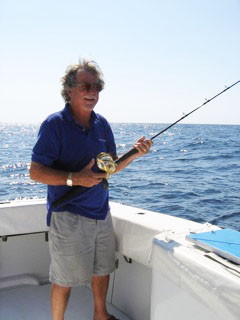The Gulf of Mexico Fishery Management Council is made up of
people that have experience, expertise, and interest in the fishery. The
chairman of the Council’s Reef Fish Committee is no exception. In fact, he is
one of the most well known fisheries scientists across the Gulf coast.
Dr. Bob Shipp has spent his life researching and
appreciating the fish of the Gulf of Mexico. His passion for the ocean was
ignited at the early age of 4 by his grandfather with whom he enjoyed countless
hours of surf fishing from the shores of Fort Walton Beach, Florida. As he grew
a bit older he and his cousins spent summers snorkeling jetties and piers
collecting fish and invertebrates for aquariums. Eventually, Bob got into SCUBA
diving when it was first becoming a recreational activity.
During his childhood Dr. Shipp moved to New Orleans,
Louisiana where he began his academic pursuit of fisheries. He focused on
marine biology as much as he could, making it the topic of every school project
possible. Dr. Shipp explains “My friends from those days joke with me now for
being the only one of the group that followed through with my harebrained
teenage career dreams.”
After graduating from Spring Hill College, Dr. Shipp attended
Florida State University where he earned his master’s degree and PhD. Shortly
thereafter he began working for the University of South Alabama teaching
anatomy and physiology. He quickly moved into a fisheries biology position
where his career flourished. He chaired the biology department and served as
the acting director at the Sea Lab on Dauphin Island. He recently retired after
serving 20 years as the chairman of the Department of Marine Sciences.
In addition to his work with the university, Dr. Shipp
served for 12 years as the Director for the Alabama chapter of the Coastal
Conservation Association. He has also been a judge for the Alabama Deep Sea
Fishing Rodeo since 1982. He authors articles for multiple magazines and
scientific papers, and he published “Dr. Bob Shipp’s Guide to Fishes of the Gulf of Mexico.”
Dr. Bob Shipp answered a few questions to give us some
insight on his perspective of our Gulf fishery.
What is the most
important issue in our fishery right now?
“I’m concerned that federal fishery law (the
Magnuson-Stevens Act) prevents the Council from trying innovative fishery
management techniques. Requiring species to be managed using quotas prevents
the use of tools like Marine Protected Areas to manage our fish. Our hands are
tied by the Act and it shows – the red snapper stock is healthier than it’s
ever been, and we still have shorter and shorter fishing seasons – we obviously
need the freedom to try something different.”
What can the Gulf
Council do to improve management?
“The Council’s options are very few. Under the current
system we can only tweak things rather than solve problems. The idea of
Regional Management, for example, still only allows the Council to change some
minor management measures like seasons and bag limits, while the major problems
still remain.”
“There are two alternatives for our future; either Congress
frees the hands of NOAA Fisheries so they have the freedom to manage properly,
or the states will take more control. Either way, we can’t manage effectively
if things remain as they are.”
Do you have a favorite fishing story to share?




